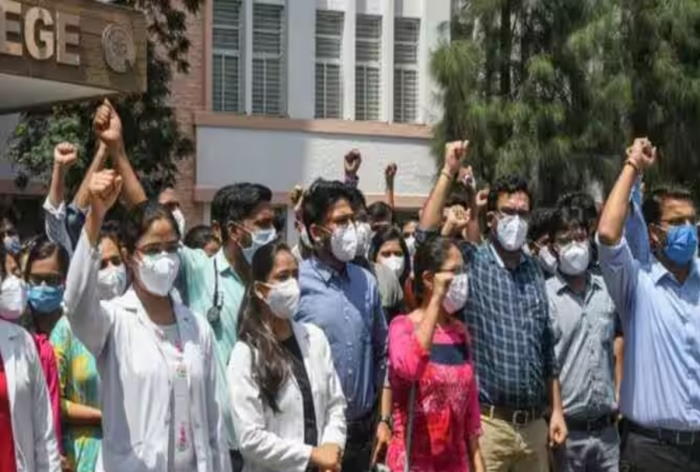
AIIMS Mock NExT 2023: Registration Closes Today, Direct link here

New Delhi: Taking a major step towards curbing the ongoing instances of violence against doctors, the National Medical Commission has allowed medical practitioners to refuse treatment in case of abusive and violent patients or relatives but they must ensure that the patient is not abandoned. The National Medical Commission (NMC) in the Professional Conduct Regulations also bar doctors from endorsing any drug brand, medicine or equipment, or advertise them.
These new regulations will replace the Medical Council of India’s (MCI) Code of Medical Ethics 2002. This is for the first time that doctors will have the right to refusal of patient treatment to unruly and violent patients. The move is aimed at discouraging violence against doctors.
“RMP is free to choose whom he will serve, except in case of a life-threatening emergency. Having accepted a case, the RMP should neither neglect the patient nor withdraw from the case without giving adequate notice to the patient and his family. If a change of RMP is needed (for example, the patient needs a procedure done by another RMP), consent should be obtained from the patient himself or the guardian. The RMP who attends to the patient will be fully accountable for his actions and entitled to the appropriate fees,” the notification stated.
It’s also mentioned in the notification under duties of RMPs towards the public and allied healthcare professionals that doctors can’t receive any gifts, travel facilities etc from pharmaceutical companies.
“RMPs and their families must not receive any gifts, travel facilities, hospitality, cash or monetary grants, consultancy fee or honorariums, or access to entertainment or recreation from pharmaceutical companies or their representatives, commercial healthcare establishments, medical device companies, or corporate hospitals under any pretext,” it said.
However, this does not include salaries and benefits that RMPs may receive as employees of these organisations, the regulations stated.
Further, the regulations said, RMPs should not be involved in any third-party educational activity like CPD, seminar, workshop, symposia, conference, etc., which involves direct or indirect sponsorships from pharmaceutical companies or the allied health sector.
Under Right to remuneration of RMP it’s mentioned in the notification that the consultation fees should be made known to the patient before examination or treatment of the patient.
“A reasonable estimation of the cost of surgery or treatment should be provided to the patient to enable an informed decision. RMP can refuse to treat or to continue to treat a patient if the fees, as indicated, are not paid,” it said.
There has been a growing demand in the medical fraternity demanding a separate law to prohibit violence against doctors and healthcare professionals. Medical practitioners have long argued that the system has failed to provide frontline workers with adequate mental and physical support.
In June, the Delhi Medical Association (DMA) has moved the Supreme Court against increasing incidents of assault, verbal abuse, threat, physical attacks and public lynching against doctors and other healthcare workers by relatives and friends of patients.
In May, a doctor undergoing internship at Hindu Rao Hospital was attacked by a woman admitted to the facility, prompting the resident doctors’ association (RDA) to demand an FIR from the administration.
On May 10, a young doctor, Vandana Das, was stabbed to death at Kerala’s Kottarakkara Taluk Hospital where she worked as part of her internship training. The postmortem report revealed that she was stabbed in her face, neck, head, and back, resulting in fatal wounds to her internal organs, including the lungs.
According to 2019 data, the IMA suggests that up to 75 per cent of doctors have faced some kind of violence at work, which is similar to the rates from other countries in the continent. Among this, nearly 50 per cent of violence was reported in intensive care units (ICUs), and, in 70 per cent of the cases, the patient’s relatives were actively involved.
(With inputs from agencies)
For breaking news and live news updates, like us on Facebook or follow us on Twitter and Instagram. Read more on Latest Health News on India.com.
Enroll for our free updates
